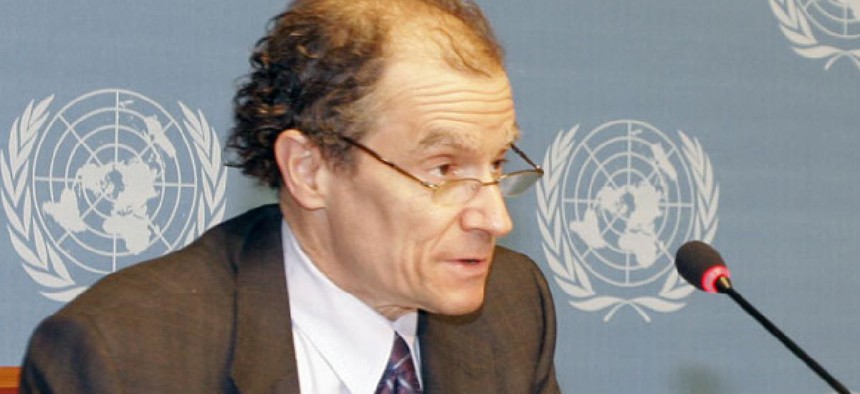
Ambassador Dan Fried will lead the new office. State Department
New State Dept. office to help organize sanctions efforts
Office will be led by Ambassador Dan Fried, who formerly directed efforts to shutter the Guantanamo Bay detention facility.
The creation of a new office in the State Department to oversee implementation of both international and domestic sanctions is evidence of the importance of economic penalties as a U.S. foreign policy tool against nations such as Iran and North Korea, one issue expert said on Friday.
The department’s new sanctions office will be led by Ambassador Dan Fried, who formerly directed the Obama administration’s efforts to shutter the Guantanamo Bay detention facility in Cuba.
“I think this is a very critical position,” said George Lopez, a past member of the U.N. Security Council’s expert panel on North Korea sanctions.
He explained that sanctions programs focused on nonproliferation frequently involve input from a host of U.S. agencies such as State, Treasury, Energy, the CIA, and specialized task forces on science and technology. The new Foggy Bottom office can now coordinate these discussions. “So the role of this new office will be kind of a schematic coordination … keeping fingers on various pulses that are important at various times,” according to Lopez.
State Department spokeswoman Victoria Nuland on Wednesday explained the rationale for creating the sanctions office: “The idea here was to create a single office with maximum experience on sanctions and to follow both implementation of sanctions, new sanctions, and relief of sanctions,” she said.
“The concern was that we’ve got pieces of sanctions in many different pieces of legislation, that affect many different relationships around the world, and that it was time, rather than doing this on a regional basis, to centralize the way we looked at how we implement sanctions,” she said.
Fried will take over sanctions responsibilities formerly held by Robert Einhorn, the State Department's special adviser for nonproliferation and arms control. Nuland said Einhorn would continue to focus on diplomacy efforts around nuclear outlier nations such as Iran and North Korea.
Lopez said the U.S. government has accepted that effective sanctions must be pursued as a “very sophisticated surgical operation” that “demands a high degree of specialization” instead of being just one of many responsibilities of country desk officers at State.
Fried’s staff in the sanctions office is expected to initially encompass six to eight staffers, as well as a new No. 2 – one-time National Security Council official Richard Nephew, according to a report by Foreign Policy’s Cable blog, which cited an unidentified State Department official.
The ambassador is expected to take on a public role in promoting the utility of sanctions. “I think that is big for State to have a real visible point person for sanctions,” said a source familiar with sanctions efforts who asked to be unidentified so that he could speak frankly about the issue.
The United States has implemented asset freezes and other economic penalties against Iran over its alleged pursuit of a nuclear-weapon capability, along with successfully pushing for four rounds of U.N. punishments. Sanctions have also been issued against North Korea, Syria, and other nations believed to pose proliferation or security dangers.
Fried will also deal with sanctions covering nations such as Cuba and Russia and on measures that are in place for reasons unrelated to proliferation concerns.
In the past, some State Department officials have had “real Treasury Department envy,” the source said.
The Treasury Department for nearly a decade has had an undersecretary for terrorism and financial intelligence who leads an office focused on cutting funding streams to terrorist organizations, WMD proliferators, and other security threats. The current undersecretary is David Cohen.
There’s been a lot of “hand-wringing” in Foggy Bottom about not having the right tools to maximize the effectiveness of sanctions, according to the source, who credited newly retired Secretary of State Hillary Clinton with bringing a renewed focus to the issue at the department.
Lopez predicted that Fried would initially study how to respond to another nuclear test by North Korea -- an event that is expected to happen imminently. “I think he is already staying up at night worrying about what we do about that one,” said the University of Notre Dame international relations professor.







